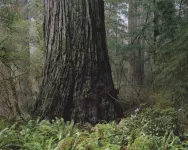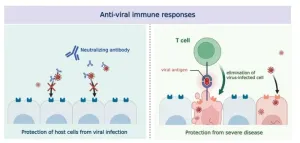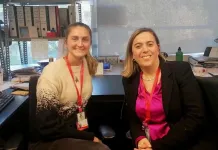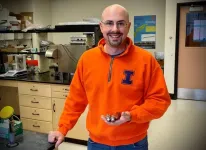(Press-News.org) The National Champion Tree Program started 83 years ago at American Forests to discover the largest, living trees in the United States. Now, the program is moving from the organization’s headquarters to a new home in the School of Natural Resources at the University of Tennessee Institute of Agriculture (UTIA).
American Forests launched the Champion Tree Program in 1940. Its vision included establishing a nationwide laboratory for the study of forestry and trees. Being housed at Tennessee’s 1862 public land-grant university will advance the program’s understanding of big trees. “The National Champion Tree Program moving to UTIA means it can continue protecting some of the largest living organisms in the U.S. while expanding the science of these trees through research,” Keith Carver, senior vice chancellor and senior vice president of the UT Institute of Agriculture said.
“We could not be happier that the University of Tennessee’s School of Natural Resources will honor the rich legacy of the National Champion Tree Program and introduce innovative new ideas, energy and science,” said Jad Daley, president and CEO of American Forests. “We also honor the thousands of tree seekers, coordinators and others nationwide who have passionately supported this program and will help it embark on a new era embedded in one of America’s leading research institutions.” American Forests is providing $200,000 through April 2025 to support the program’s transition to the School.
Former Tennessee Champion Tree Program Director and UT graduate Jaq Payne will lead the national program as the newly appointed director. He believes UTIA is uniquely positioned to be a hub for Champion Tree research. “Through the university’s exceptional research capabilities, we’ll learn more about these gentle giants, how best to preserve their majesty for future generations and how to help our newly planted trees become future champions,” Payne said.
The School also directs the state Champion Tree Program. Payne took it over in 2021. The Tennessee Department of Agriculture Division of Forestry managed the program until 2016, when it was transferred to the School. “Under the School’s management, Tennessee’s state program has evolved to be one of the best-managed Champion Tree programs in the nation,” former Tennessee State Forester David Arnold said before retiring from his position in early January 2024. “The School now has the honor of managing the National Champion Tree Program. It is exciting to realize the program that identifies the largest representative of individual tree species for the nation resides in Tennessee.”
Urban Forestry Professor Sharon Jean-Philippe advises the Tennessee Champion Tree Program and helped with moving the national program to UT. She said it is an honor for the School to host both programs and to have Payne, her former master’s student and now graduate, be the national director. Jean-Philippe added, “Developing opportunities for students to apply what they have learned in the classroom to real-life situations is an important part of the high-impact educational practices we provide through academic internships.”
The national program started publishing a list of Champion Trees in 1945. Today’s National Register of Champion Trees lists 561 species found across the U.S. from the General Sherman Sequoia in California to a 90-foot-tall white oak in Virginia. The tradition of finding and monitoring these large organisms will continue. “We’re excited to advance the legacy of the Champion Tree Program and administer this important and historical program for the entire country,” Don Hodges, School of Natural Resources Director, said.
The program identifies Champion Trees based on a point system. The trunk circumference, height and average crown spread make up the total points for a Champion Tree. The current register is being updated and will be published in late 2024. The first round of public nominations for new Champion Trees will open in the spring of 2025. You can find a full breakdown of the timeline on the program’s website: nationalchampiontree.org.
American Forests is a nonprofit organization that creates healthy and resilient forests, from cities to large natural landscapes, that deliver essential benefits for climate, people, water and wildlife. It advances its mission through forestry innovation, place-based partnerships to plant and restore forests, and movement building.
The UT School of Natural Resources is part of the Herbert College of Agriculture, UT AgResearch and UT Extension at the University of Tennessee Institute of Agriculture. The curricula focus on a mastery learning approach, emphasizing practical, hands-on experiences. The School’s faculty, staff and students conduct research and extension that advance the science and sustainable management of our natural resources. For more information, visit naturalresources.tennessee.edu.
The University of Tennessee Institute of Agriculture is composed of the Herbert College of Agriculture, UT AgResearch, UT College of Veterinary Medicine, and UT Extension. Through its land-grant mission of teaching, research and Extension, the Institute touches lives and provides Real. Life. Solutions. utia.tennessee.edu.
END
National champion tree program finds new home
Effort to identify and study big trees across the US moves to the University of Tennessee School of Natural Resources
2024-01-19
ELSE PRESS RELEASES FROM THIS DATE:
New AEM study evaluates potential disparities in restraint use in the emergency department at a minority-serving safety-net hospital
2024-01-19
Des Plaines, IL — A new study that contributes additional data to a growing body of evidence demonstrating disparities in restraint use in the emergency department (ED) has been published in the January issue of Academic Emergency Medicine (AEM), the peer-reviewed journal of the Society for Academic Emergency Medicine (SAEM). The study, titled Disparities in use of physical restraints at an urban, minority-serving hospital emergency department evaluates the association between race/ethnicity and the use of restraints in an ED population ...
CRISPR off-switches: A path towards safer genome engineering?
2024-01-19
Using CRISPR, an immune system bacteria use to protect themselves from viruses, scientists have harnessed the power to edit genetic information within cells. In fact, the first CRISPR-based therapeutic was recently approved by the FDA to treat sickle cell disease in December 2023. That therapy is based on a highly studied system known as the CRISPR-Cas9 genetic scissor.
However, a newer and unique platform with the potential to make large-sized DNA removals, called Type I CRISPR or CRISPR-Cas3, waits in the wings for potential therapeutic use.
A new study from Yan Zhang, ...
Evolution of the human immune system in the post-Omicron era
2024-01-19
It has been 4 years since the start of the COVID-19 pandemic. SARS-CoV-2 has yet to be eradicated and new variants are continuously emerging. Despite the extensive immunization programs, breakthrough infections (infection after vaccination) by new variants are common. New research suggests that human immune responses are also changing in order to combat the never-ending emergence of new SARS-CoV-2 variants. Specifically, it has been discovered the immune system that encountered breakthrough infection by the Omicron variant acquires enhanced immunity against future versions of the Omicron.
A team of South Korean scientists ...
First therapeutic target for preserving heart function in patients with pulmonary hypertension
2024-01-19
A team led by Dr. Guadalupe Sabio at the Centro Nacional de Investigaciones Cardiovasculares (CNIC) in Madrid has discovered a possible therapeutic target for pulmonary hypertension.
The study, published in the journal Science Advances, identifies the first therapeutic target that can be modulated to preserve cardiac function in pulmonary hypertension, providing hope in the fight against this rare but fatal disease for which there is currently no cure.
Pulmonary hypertension is a condition of elevated blood pressure in the arteries that carry deoxygenated blood to the lungs. This increased pulmonary blood pressure puts the heart under continuous strain ...
Endless biotechnological innovation requires a creative approach
2024-01-19
Scientists working on biological design should focus on the idiosyncrasies of biological systems over optimisation, according to new research.
In a study, published today in Science Advances, researchers from the Universities of Bristol and Ghent have shown how exploring the unknown may be the crucial step needed to realise the continual innovation needed for the biotechnologies of the future.
Recognising the role of open-endedness in achieving this goal and its growing importance in fields like computer science and evolutionary biology, the team mapped out how open-endedness is linked to bioengineering practice today and what would be required to achieve it in ...
The secret life of CD4+ T cells: from helpers to melanoma fighters
2024-01-19
In the study led by the Peter Doherty Institute for Infection and Immunity (Doherty Institute) and published in Science Immunology, the researchers found that CD4+ T cells, traditionally called ‘helper T cells’ for their role in aiding the activation of other immune cells, are remarkably effective in controlling melanoma.
University of Melbourne’s Dr Emma Bawden, Postdoctoral Researcher at the Doherty Institute and lead author of the study, said this discovery challenges the conventional understanding of the role of CD4+ T cells in cancer immunity.
“Our ...
Study says ice age could help predict oceans’ response to global warming
2024-01-19
A team of scientists led by a Tulane University oceanographer has found that deposits deep under the ocean floor reveal a way to measure the ocean oxygen level and its connections with carbon dioxide in the Earth's atmosphere during the last ice age, which ended more than 11,000 years ago.
The findings, published in Science Advances, help explain the role oceans played in past glacial melting cycles and could improve predictions of how ocean carbon cycles will respond to global warming.
Oceans adjust atmospheric CO2 as ice ages transition to warmer climates by releasing the greenhouse ...
From snack to science: Innovative grant brings popcorn into the classroom
2024-01-19
URBANA, Ill. — In a few years, popcorn could become a standard element in science classrooms across Illinois and the nation. With funding from a new USDA grant, a University of Illinois Urbana-Champaign crop scientist and collaborating educators are developing a popcorn-based curriculum to reinforce concepts around agricultural science, artificial intelligence, biotechnology, computer science, genomics, research methods, and more for 4-H and high school students.
The funding may be new, but Tony Studer has proselytized ...
The case of a patient with multiple myeloma cured after hepatitis treatment reveals that this cancer can be caused by viruses, and opens up new treatment options
2024-01-19
Hepatitis C and B viruses are one of the causes of this type of cancer –a most frequent on in blood–, and the pathologies that precede it, known as gammopathies.
Early identification of an infection with these viruses can help doctors to prescribe appropriate treatment and prevent it from leading to malignant pathologies.
The research has been discussed in an editorial article in the journal Haematologica
A few years ago, a patient was cured of multiple myeloma after being treated for hepatitis C, astounding researchers from the group led by Joaquín ...
Why family businesses get more from women leaders
2024-01-19
Family businesses account for more than 70 percent of global GDP, and survey data shows that they are much friendlier to female leadership: up to 55 percent have at least one woman on their board and 70 percent are considering a woman for their next CEO. Experts have attributed this outlier gender parity to an emphasis on long-term strategies or family values. But a new study, published in the Strategic Entrepreneurship Journal, suggests that women’s success as leaders in family businesses is deeply rooted in how employees interpret their leadership style.
“Family firms tend to focus on being inclusive ...
LAST 30 PRESS RELEASES:
More time spent on social media linked to steroid use intentions among boys and men
New study suggests a “kick it while it’s down” approach to cancer treatment could improve cure rates
Milken Institute, Ann Theodore Foundation launch new grant to support clinical trial for potential sarcoidosis treatment
New strategies boost effectiveness of CAR-NK therapy against cancer
Study: Adolescent cannabis use linked to doubling risk of psychotic and bipolar disorders
Invisible harms: drug-related deaths spike after hurricanes and tropical storms
Adolescent cannabis use and risk of psychotic, bipolar, depressive, and anxiety disorders
Anxiety, depression, and care barriers in adults with intellectual and developmental disabilities
Study: Anxiety, gloom often accompany intellectual deficits
Massage Therapy Foundation awards $300,000 research grant to the University of Denver
Gastrointestinal toxicity linked to targeted cancer therapies in the United States
Countdown to the Bial Award in Biomedicine 2025
Blood marker from dementia research could help track aging across the animal world
Birds change altitude to survive epic journeys across deserts and seas
Here's why you need a backup for the map on your phone
ACS Central Science | Researchers from Insilico Medicine and Lilly publish foundational vision for fully autonomous “Prompt-to-Drug” pharmaceutical R&D
Increasing the number of coronary interventions in patients with acute myocardial infarction does not appear to reduce death rates
Tackling uplift resistance in tall infrastructures sustainably
Novel wireless origami-inspired smart cushioning device for safer logistics
Hidden genetic mismatch, which triples the risk of a life-threatening immune attack after cord blood transplantation
Physical function is a crucial predictor of survival after heart failure
Striking genomic architecture discovered in embryonic reproductive cells before they start developing into sperm and eggs
Screening improves early detection of colorectal cancer
New data on spontaneous coronary artery dissection (SCAD) – a common cause of heart attacks in younger women
How root growth is stimulated by nitrate: Researchers decipher signalling chain
Scientists reveal our best- and worst-case scenarios for a warming Antarctica
Cleaner fish show intelligence typical of mammals
AABNet and partners launch landmark guide on the conservation of African livestock genetic resources and sustainable breeding strategies
Produce hydrogen and oxygen simultaneously from a single atom! Achieve carbon neutrality with an 'All-in-one' single-atom water electrolysis catalyst
Sleep loss linked to higher atrial fibrillation risk in working-age adults
[Press-News.org] National champion tree program finds new homeEffort to identify and study big trees across the US moves to the University of Tennessee School of Natural Resources






